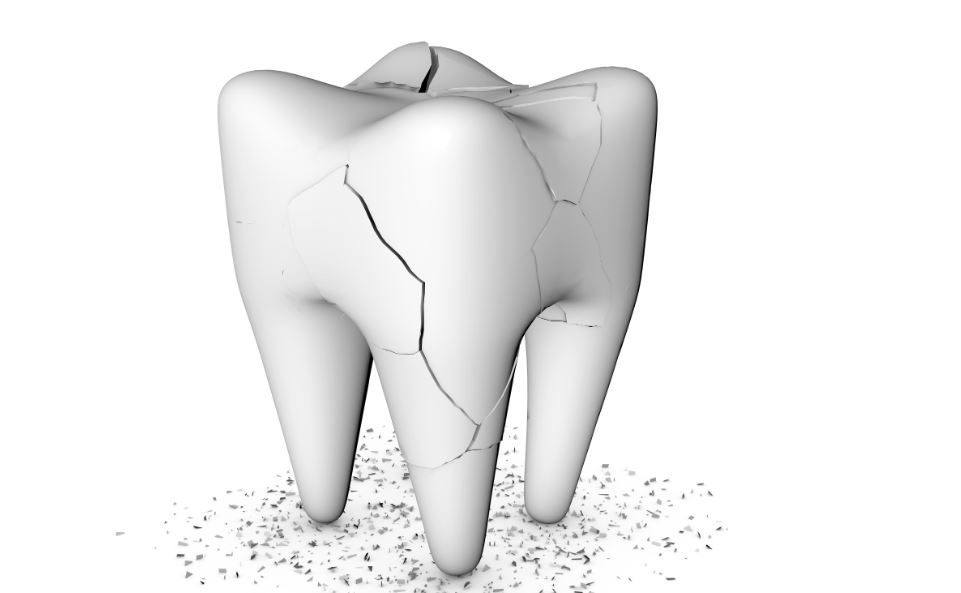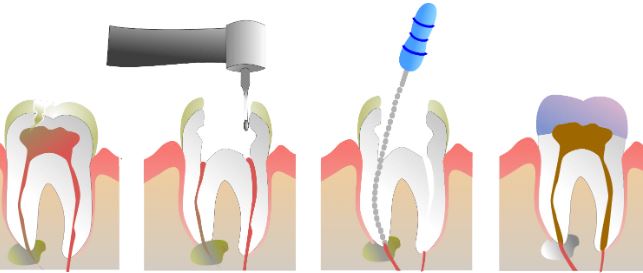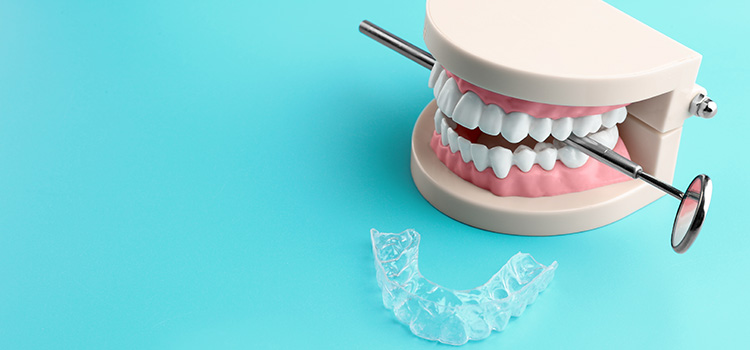
There are various ways in which teeth can become cracked or develop cracks. Cracked teeth are a common dental issue that can range from minor, superficial cracks to more severe fractures.
Here are some different ways teeth can become cracked:
The severity of a cracked tooth can vary widely, ranging from minor surface cracks that don’t require treatment to deep fractures that may necessitate dental intervention, such as a crown, root canal, or extraction. If you suspect you have a cracked tooth or experience any tooth pain or sensitivity, it’s crucial to consult with a dentist for a proper evaluation and appropriate treatment recommendations. Early detection and treatment can help prevent further damage and discomfort.
Related Article: My Tooth Hurts! Do You have a Broken or Cracked Tooth?
While it’s not always possible to prevent cracked teeth entirely, there are several measures you can take to reduce the risk of experiencing cracked teeth:
While these measures can reduce the risk of cracked teeth, accidents can still occur. If you suspect you have a cracked tooth or experience any tooth pain or sensitivity, it’s essential to seek prompt evaluation and treatment from a dentist. Early intervention can prevent the problem from worsening and ensure the best possible outcome for your oral health.
Mouthguards are essential for protecting your smile and are suitable for individuals of all ages, including children and adults. With many kids returning to school and participating in various sports like basketball, soccer, football, volleyball, gymnastics, and more, it’s crucial to recognize the significance of mouthguards.
Even if you or your child engage in recreational activities such as skateboarding or hiking, mouthguards offer a valuable layer of protection to reduce the risk of oral injuries and possibly prevent cracked teeth.
Moreover, mouthguards are commonly used by adults and children who experience Bruxism, a condition characterized by teeth grinding at night. At Adams Dental Group, we specialize in creating custom-fitted mouthguards that are not only comfortable but also perfectly tailored to fit your mouth. These mouthguards effectively safeguard your teeth during sleep, preventing damage caused by teeth grinding, and ensuring a restful night’s sleep.
Mouthguards are dental devices designed to protect the teeth and mouth from injury during physical activities or to address specific dental issues.
Here are some key points about mouthguards:
Advancements in dental care and materials lead to new developments in mouthguard technology and options. It’s a good idea to consult with your dentist for the most up-to-date information and recommendations regarding mouthguards.
While the term ‘custom mouthguard’ often brings to mind protection during sports, it’s important to recognize that not all mouthguards serve the same purpose. The Mandibular Advancement Device (MAD), as we fondly refer to it, is a unique nighttime mouthguard.
Unlike sports mouthguards, the MAD is designed to fit snugly over both your upper and lower jaws. Its primary goal is to gently pull forward and reposition your jaw, creating an unobstructed airway. This repositioning can significantly reduce snoring and greatly enhance your breathing while you sleep.
Mouthguards protect your smile, whether you’re an athlete or grind your teeth while you sleep!
Related Article: Mouthguards Provide Protection for Your Teeth
Certainly, stress can have a significant impact on oral health. Addressing these issues is essential to maintaining a healthy mouth. Here’s an outline of the six main ways stress can affect oral health:
We feel it’s important to raise awareness about these connections between stress and oral health and encourage individuals to manage stress effectively through relaxation techniques, exercise, and seeking support when needed. Additionally, maintaining consistent oral hygiene practices and seeking dental care for stress-related oral issues are essential steps to prevent cracked teeth and preserve oral health during stressful times.
Related Article: Stressed Out Oral Health: Gum Disease, Clenching and Grinding
One common consequence of stress is teeth grinding, a condition known as bruxism. Stress can cause us to clench our jaws and grind our teeth during the day and even at night. For individuals already struggling with teeth grinding, stress can exacerbate the problem, making it even more challenging to handle and even more difficult to prevent cracked teeth.
Untreated bruxism can lead to serious issues like loosening teeth and temporomandibular joint disorder (TMJ), which results in pain and discomfort in the jaw. To address this, consider discussing night guard options with us to effectively put a stop to teeth grinding while you sleep.
During the day, it’s essential to be mindful of any jaw clenching and make an effort to relax your jaw when possible. Try to keep your teeth slightly apart when you’re not actively chewing or eating. These simple strategies can help mitigate the effects of stress-induced teeth grinding and promote better oral health.
Sleep apnea, while a relatively new term for many, is a common sleep disorder that affects individuals worldwide. This chronic condition is often characterized by loud and disruptive snoring. It occurs when a person experiences shallow or frequent pauses in their breathing during a typical night’s sleep.
While initially, it may seem like a mere nuisance and potentially an issue for sleeping partners, sleep apnea can be a significant health concern. It carries the potential to increase the risk of various health problems, including high blood pressure, heart disease, diabetes, complications during pregnancy, and a range of other issues.
Recognizing the signs of sleep apnea and seeking appropriate diagnosis and treatment is essential to mitigate its potential health consequences and improve overall well-being.
Learn more about Sleep Apnea
Dr. Roberts and his team at Adams Dental Group can play a crucial role in helping you prevent cracked teeth by crafting a custom mouthguard or oral appliance designed for nighttime use. These devices not only protect your teeth but also have a positive impact on your dental and mental health. There’s a strong connection between dental health and mental well-being, and fortunately, mouthguards provide an effective solution. They not only safeguard your teeth but can also assist in managing issues like sleep apnea and snoring.
Each mouthguard is meticulously custom-made by Dr. Skrobanek to ensure a comfortable fit that keeps your teeth separated, preventing them from grinding together. This personalized approach ensures that you get the maximum benefit from your mouthguard while promoting your overall oral health and quality of sleep.
While the CPAP machine remains the most effective treatment for advanced cases of sleep apnea, such as complex sleep apnea, it’s crucial to acknowledge that it might not be the right solution for everyone. If the CPAP machine doesn’t work for you, it might be time to consider a Mandibular Advancement Device (MAD).
At Adams Dental Group, Dr. Roberts can provide you with a customized MAD appliance. This custom mouthguard is designed to be both durable and comfortable for use during sleep. Importantly, many insurance plans typically cover the cost of this treatment, making it a viable and accessible option for addressing sleep apnea and it just might help you prevent cracked teeth.
Dr. Travis A. Roberts, DDS August 22nd, 2023
Posted In: Sleep Apnea

If you’re needing a root canal procedure, there’s no reason to worry and every reason to move forward. Root canals are a dental procedure that eliminate bacteria from infected tooth roots and prevent reinfection because the infected pulp is removed and the surrounding area is carefully cleaned, filled, and then sealed. Every year, millions of people undergo root canal treatment to treat diseased or damaged teeth. A root canal will relieve any oral pain you’ve been experiencing and can make your teeth healthy once again.
Dr. Travis A. Roberts, DDS May 10th, 2022
Posted In: Services | Procedures
Tags: CEREC same day crown, cracked tooth, root canal, root canal symptoms

Did you know that about 15% of people have a habit of grinding their teeth or clenching their jaws, a condition called bruxism? Clenching and grinding can be caused by multiple factors, such as stress or anxiety, and studies have shown that even sleep apnea can sometimes go hand-in-hand with grinding and clenching your teeth at night.
So, what can be done to help with this? A Night guard is often the answer to this problem!
Dr. Travis A. Roberts, DDS February 9th, 2021
Posted In: Sleep Apnea
Tags: broken tooth, cracked tooth, restorative dentistry, teeth clenching, teeth grinding